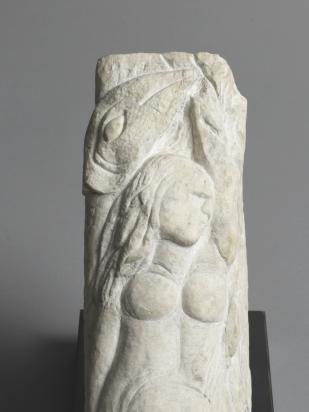This high relief in marble portrays a nude woman reclining on a fish, her head resting gently on her arm, in a position of sleep or deep relaxation. It is a reminiscence of the classic representation of Ariana sleeping. A recurring iconographic element in Chagall’s pictorial work, sculpted and shaped, the fish, upon which the sculpted woman is reclining in this piece, is a symbol borrowed from the Jewish and Christian religions. It ties the artist to his roots and to the holy, but first and foremost to the essence of life, as “the Earth’s true eye is water. In our eyes, water is what dreams1.” At times gustatory, spiritual, religious, and plastic, the fish here is associated with the female body. It is full and round, evoking fertility and plenitude by protecting the female figure and providing a place for her to recline.
The half-moon stone carving hugs the contours of the fish and the female body, creating a dynamic of equilibrium, held in balance by the black marble base. The highly understated surface treatment of the stone alternates between polished and coarser surfaces, on which burin marks are still visible. The aesthetic approach of working with the material and its natural appearance, the vision of a singular primitivism, brings the original shapes of prehistoric Venus figures back to the forefront. The rendering of volumes and the key position accorded to the circular form (face, breasts, abdomen), as well as the voluntarily archaic appearance of the fish (scales, fin), also evoke Romanesque art and, more specifically, the sculpted chapiters of churches and cathedrals, including those of Autun, which Chagall discovered on a journey to various regions of France between 1925 and 1928.
Sculpture
Woman With Fish
(Femme au poisson)
- No. S-9
- 1952
- Sculpture in the round
- Carrara white marble
- 11 15/16 x 13 9/16 x 6 1/8 in. (30.3 x 34.5 x 15.5 cm)
-
Signed Marc Chagall and dated 1952 on the back
- Private collection

3D - 02/17/2023
Woman With Fish (1952)
Photo : Art Graphique et Patrimoine 2022.







